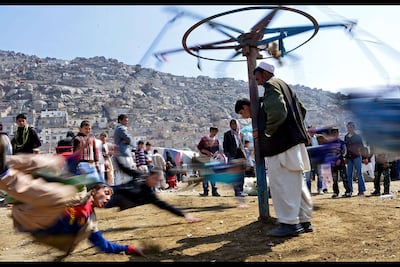Every year as spring comes around Iranians and thousands of others around the world prepare to celebrate the new year. Nowruz marks not just the start of spring but the start of the solar Hijri year, which has its roots in Zoroastrianism, an ancient religion.
Over the years much of its religious appeal has been set aside and the holiday is largely celebrated secularly. For many Iranians whose families have moved overseas during decades of crisis and sanctions, reconnecting with Nowruz has a special emotional significance.
Iran's diaspora spans continents and numbers about four to five million people, and while Nowruz is a major holiday and largely considered secular, Iranians outside Iran have differing relationships with the holiday, whether based on their religion or their location.
Mansour Ohebshalom a Persian-American Jew, says he did not grow up with the holiday nor did his Iranian Jewish father.
According to Mr Ohebshalom his father grew up in a religious Jewish home in Tehran and in their household, Nowruz was largely considered to be for non-Jewish Iranians, whereas they focused on strictly Jewish traditions.
Now, however, he says he and many in his Iranian Jewish community celebrate Nowruz as a cultural tradition rather than one that has any religious ties. Mr Ohebshalom likens the holiday in the Persian Jewish community to the Mexican "Dia de Los Muertos", saying that it is celebrated as a commercial holiday rather than one that has deep meaning.
He says until he was about 18 years old he did not even know what Nowruz was and began celebrating the holiday only in early adulthood. At 22 he became interested in connecting with and learning more about his Iranian heritage.
"It was exciting to learn about what it means to have a culture outside of being American," he says.

Mr Ohebshalom says during that time he became closer to his Iranian family and took time to study what it meant to celebrate holidays like Nowruz, reading the famous Book of Kings (Shahnameh) all in hope of understanding and connecting with his Persian heritage.
With the pandemic, Mr Ohebshalom says some of the Nowruz traditions he is reviving have fallen to the wayside but he hopes to make it part of his own personal tradition. He plans in future to pass down the cultural aspects of being Persian to his children while also maintaining his Jewish identity.
For Sima Amiri, Nowruz was always a part of growing up and her family made sure to celebrate every year. But, she says, it took years for her to appreciate the cultural tradition of Nowruz.
She says she would often try to hide her cultural differences in school. "I worked to actively push away and disconnect from being Iranian in an attempt to fit into the more heterogeneous culture around me."
But with time, Ms Amiri says she has come to greatly appreciate the holiday and its message of renewal and rebirth.
She says the holiday now helps her feel a sense of community and identity that as an adult she can finally appreciate. This year, in a show of her embrace of the holiday, Ms Amiri is planning to prepare her own Haft Sin for the first time.
The Haft Sin is a traditional Nowruz custom and means "the seven S's". It involves arranging seven symbolic objects and foods that all begin with the letter S in Persian, with each object representing positive themes including fertility, health, love and healing.
The arrangement will stay on display in Iranian homes until the last day of the new year celebrations, which is the 13th day of the new year.
While Mr Ohebshalom and Ms Amiri are younger members of the diaspora, the older generations, more affected by the revolution, have a more nostalgic view of the holiday.
Kamran Tabrizi, who left Iran at the start of the revolution, says they celebrate Nowruz because it reminds them of a time that has since been lost, "it reminds me of happier times, of an Iran that no longer seems to exist".
Mr Tabrizi says he and his wife have made sure to keep Nowruz alive as a tradition by passing it down to their children. But he he worries that as his children and grandchildren become more American, those traditions may eventually disappear.


